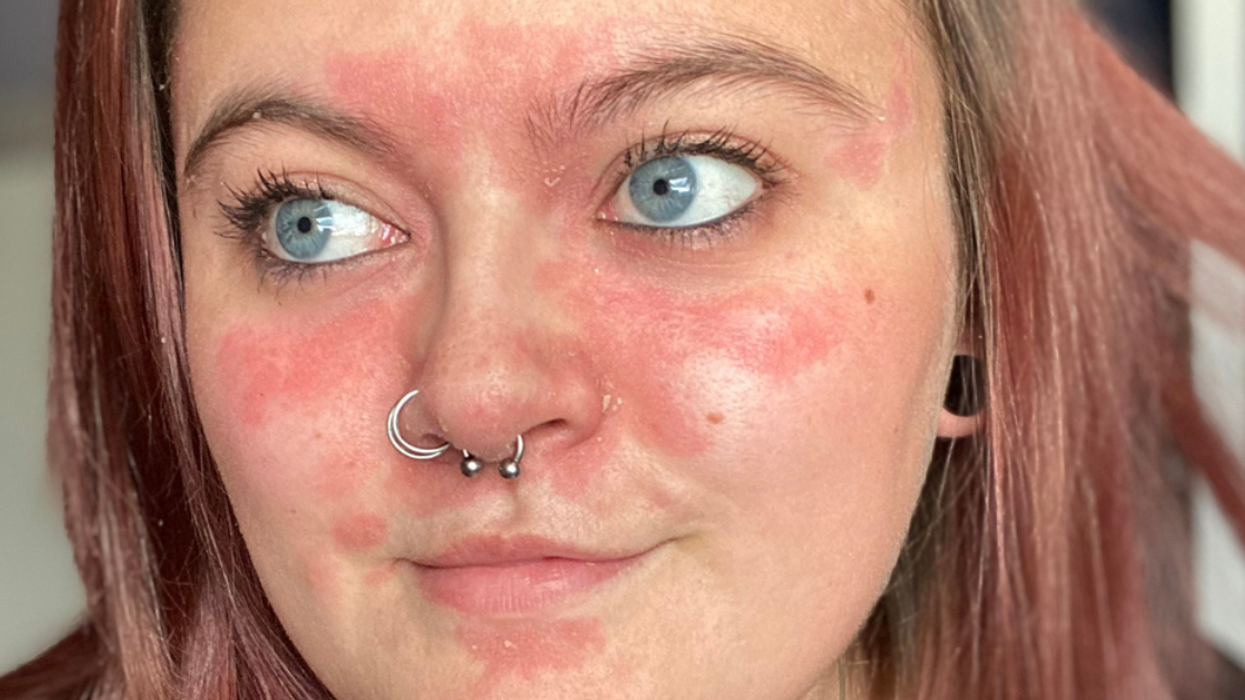A woman whose psoriasis coated 95% of her body, prompting doctors to tell her it was one of the worst cases they had ever seen, has bravely embraced her condition and not let it hold her back.
Hannah Williams tried to hide her skin, hating how other people stared and their eyes “drifted over" to her psoriasis patches as they talked to her.
By the time she finally sought help from a dermatologist, she said her condition was so severe that she “looked like a burns victim."

Hannah was just 12 when she first noticed dry flakes of skin in her hair.
Initially, doctors thought she simply had dandruff, but around a year later she was diagnosed with psoriasis.
Over time, her symptoms worsened until 95% of her body was covered. This shattered her confidence, so she hated anyone seeing her arms or legs and was too self-conscious even to visit the hairdressers.
But now, Hannah is determined to embrace her skin and is encouraging others to do the same by supporting Heads Up to Psoriasis, a campaign aiming to empower people living with scalp psoriasis to speak out.
“Over the years, I have had some tough times with psoriasis," she said.
“It wasn't necessarily other people – it was me, feeling as if everyone was constantly staring at me. But now I have come to embrace my condition. It's not going anywhere – it's a part of me. Why should I let it hold me back?"

Hannah had just started secondary school when her first symptoms appeared, and she did not initially believe they were anything to worry about, particularly when doctors reassured her she likely just had dandruff.
“Luckily I didn't have any problems with people being nasty at school," she said.
“Everybody else just thought it was dandruff, too. I was only young at the time so didn't really realize what was going on."

But when the patches in her scalp did not disappear over time, Hannah returned to the doctors and was diagnosed with psoriasis.
According to the NHS, the condition is caused by the overproduction of skin cells.
Usually, skin cells are made and replaced every three to four weeks, but in people living with psoriasis the process takes just three to seven days.
The resulting build-up is what creates the patches, which can be flaky, red and painful.
“For a few years, my skin was fairly manageable," said Hannah.
“But when I left school at 16 to go to college, things suddenly got a lot worse. The patches migrated down from my scalp until they were covering the rest of my body."
“It was especially bad on my arms and hands. I was studying science at college, so had my sleeves rolled up and arms on show a lot, which made me feel self-conscious. I could feel people looking."
When she was around 18, Hannah was referred to a dermatologist.
“By that point, the psoriasis was really severe. It was covering about 95 percent of my body and doctors told me it was one of the worst cases they'd ever seen," she continued.
“I looked like a burns victim. My skin would constantly flake, and I would feel so self-conscious that I would always cover up and hide away."

Since then, Hannah has tried various treatments including injections and creams.
She has found phototherapy to be the most helpful. During the process the skin is exposed to certain types of ultraviolet light, but is wary of having it too often as long-term treatment with ultraviolet A (UVA) could increase her risk of developing skin cancer.
However, getting to a place of acceptance has not been an easy road for Hannah.
“Over the years, I'd try and make myself as comfortable as possible, but it was tough. I never wanted my skin to be on show. People would mistakenly think psoriasis is contagious, or conflate it with being dirty in their heads," she said.
“I would almost always cover up, but I remember one time, going on holiday to Rome for my 21st and deciding to bare my legs. All day, I could feel eyes staring at me. It just made me want to hide away."
As Hannah's psoriasis stems from her scalp, going to the hairdressers is something that is especially difficult.
“I've actually never had my hair done in a salon. As a youngster, I was one of those kids whose mum cut their hair," she said.
“But as I've got older, certainly over the last few years, I have definitely made the conscious decision to stay away due to psoriasis. I just don't want to be uncomfortable, so I'm the girl who gives myself slightly wonky haircuts at home."
And sadly, she is not alone.
Research from Heads Up to Psoriasis by LEO Pharma in partnership with the Psoriasis Association and Lions Barber Collective has found that two thirds of people with the condition have deliberately avoided salon appointments, and 40% felt uncomfortable discussing their scalp with their hair stylist.
As well as tips on how to look after scalp psoriasis, the campaign has designed some handy tools to empower people living with the condition to discuss it openly with hairdressers, barbers and medical professionals.
“Talking about the condition is key, as there are so many misconceptions out there," Hannah said.
“It took me a while to get here but now, I'm an open book. If somebody wants to ask me about psoriasis, I'm more than happy to answer their questions. To me, that's the best way to tackle the stigma. I explain to people that psoriasis isn't contagious, and that it's essentially a cousin of eczema. Once they understand it, they know it's nothing to be judgmental or nasty about."
Now, Hannah is still trying to figure out what her particular triggers are so far identifying stress, alcohol and any skin products that are overly perfumed.
By sharing her story, she wants to both raise awareness of psoriasis and encourage others living with skin conditions to embrace them.
“I completely understand why people feel self-conscious. I've been there, when someone is talking to you and you feel their eyes drifting over to one of your psoriasis patches," she said.

“But if you shut down conversations, that makes other people put their walls up too, then you get nowhere," Hannah continued.
“The quicker you embrace it, the quicker you'll feel better. Psoriasis is incurable, so I know it isn't going anywhere. It's part of who I am, and if people don't like it, that's their problem, not mine. I'm not going to let it hold me back. Why should it?"
For information on the campaign, click here














 Roberto Schmidt/AFP via Getty Images
Roberto Schmidt/AFP via Getty Images





 u/pizzaratsfriend/Reddit
u/pizzaratsfriend/Reddit u/Flat_Valuable650/Reddit
u/Flat_Valuable650/Reddit u/ReadyCauliflower8/Reddit
u/ReadyCauliflower8/Reddit u/RealBettyWhite69/Reddit
u/RealBettyWhite69/Reddit u/invisibleshadowalker/Reddit
u/invisibleshadowalker/Reddit u/Wishnik6502/Reddit
u/Wishnik6502/Reddit u/kateastrophic/Reddit
u/kateastrophic/Reddit u/blking/Reddit
u/blking/Reddit u/SlagQueen/Reddit
u/SlagQueen/Reddit u/geezeslice333/Reddit
u/geezeslice333/Reddit u/meertaoxo/Reddit
u/meertaoxo/Reddit u/crystal_clear24/Reddit
u/crystal_clear24/Reddit u/stinkpot_jamjar/Reddit
u/stinkpot_jamjar/Reddit
 u/Bulgingpants/Reddit
u/Bulgingpants/Reddit
 @hackedliving/TikTok
@hackedliving/TikTok @hackedliving/TikTok
@hackedliving/TikTok @hackedliving/TikTok
@hackedliving/TikTok @hackedliving/TikTok
@hackedliving/TikTok @hackedliving/TikTok
@hackedliving/TikTok @hackedliving/TikTok
@hackedliving/TikTok @hackedliving/TikTok
@hackedliving/TikTok @hackedliving/TikTok
@hackedliving/TikTok @hackedliving/TikTok
@hackedliving/TikTok @hackedliving/TikTok
@hackedliving/TikTok
 @vanderjames/Instagram
@vanderjames/Instagram @vanderjames/Instagram
@vanderjames/Instagram @vanderjames/Instagram
@vanderjames/Instagram @vanderjames/Instagram
@vanderjames/Instagram @vanderjames/Instagram
@vanderjames/Instagram @vanderjames/Instagram
@vanderjames/Instagram @vanderjames/Instagram
@vanderjames/Instagram @vanderjames/Instagram
@vanderjames/Instagram @vanderjames/Instagram
@vanderjames/Instagram @vanderjames/Instagram
@vanderjames/Instagram